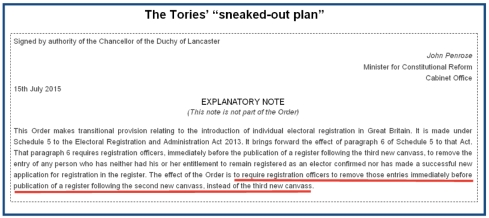It’s safe to assume that, for all their passion, compassion and general humanity, Jeremy Corbyn’s orations aren’t the kind that will subsequently be read carefully, section by non-sequential section, even by devoted Corbynistas. So, if I don’t mention that the detail underpinning one of the more structured sections of his leader’s conference speech could have come straight from my recent Electoral Integrity Project workshop paper, it’s highly unlikely anyone else will.
Corbyn’s account and call-to-action came about three-quarters of the way through:
“Just before the summer, the Tories sneaked out a plan to strike millions of people off the electoral register this December – a year earlier than the advice of the independent Electoral Commission … They want to gerrymander electoral boundaries across the country by ensuring new constituencies are decided on the basis of the missing registers when the Boundary Commission starts its work in April 2016.
“Two million or more people could lose their right to vote. From today, Labour starts a nationwide campaign for all our members to work in every town and city, in every university as students start the new term, to stop the Tory gerrymander.”
If we’re being picky, “millions” is, as used by Corbyn, rhetorical hyperbole – though that doesn’t diminish the story’s importance. Secondly, Labour’s new campaign is a piggy-back on the Daily Mirror’s existing ‘No Vote, No Voice’ campaign. Thirdly, the Conservatives’ ploy may be a cynical, anti-democratic connivance, but it doesn’t involve the manipulation of constituencies’ geographical boundaries in the traditional American map-drawing sense of ‘gerrymandering’.
Fourthly, you might feel, is: So what? – none of this seems much to do with local government. But you’d be wrong: there are two big links. The first elections contested on the December electoral registers with which Corbyn is initially concerned are next May’s London Mayoral and Assembly elections – the first massive electoral test of his leadership – and the other regional and local elections on the same day.
The other link is that voter registration in the UK – as in most of Western Europe, Russia, China, and Kazakhstan, but not that many other places – is a responsibility of local government, in our case through local Electoral Registration Officers (EROs). Indeed, it is with them that this story starts.
We’re currently nearing the completion of the biggest change to UK voter registration since the introduction of the universal franchise: the replacement of the essentially Victorian household- and annual canvass-based registration system, and the extension into Great Britain elections of Individual Electoral Registration (IER) – belatedly following its 2002 adoption in Northern Ireland. The actual completion of the transition will now, following the Government’s “sneaked-out plan” referred to by the Labour leader, be this December, with the publication of the new electoral registers.

Revised and updated as usual, these registers will also have removed all the household-registered voters whose names were ‘carried forward’ to enable them to vote in last May’s general and local elections, but who have not or not yet registered individually. This removal, as specified in the 2013 Electoral Registration and Administration (ERA) Act, was to have taken place in December 2016, and the Electoral Commission (EC) estimated that on the May 2015 registers there were 1.9 million of these ‘carried forward’ entries (4% of the total).
Obviously, some of these names will have registered since May, others will have died, or moved elsewhere and registered individually at a new address. But, if 1.9 million was good enough for the Commission, and ministers unable to question it by keeping the registers open, it’s hard to blame Corbyn for rounding it up to a possible “two million or more”.
But that’s only the first of his concerns. The second – and undoubtedly the driver of the Conservatives’ whole strategy – is that, with the UK being one of those countries using electoral registers rather than population as the basis for determining the size of parliamentary constituencies, it is these December registers that will be used, almost certainly exclusively, in the forthcoming Parliamentary Boundary Review, which in addition will cut the number of MPs in the 2020 parliament from 650 to 600.
The virtue of these December registers will be that they provide the Review with a high degree of accuracy and relatively few false entries. Their downside is that they will have a higher, though unknowable, level of incompleteness than if the transition had run its additional 12 months. Missing – either because they’ve been ‘carried forward’ and haven’t got round to registering individually, or because they were among the 7.5 million electors estimated by the Electoral Commission to have been incorrectly registered on the February/March 2014 registers (p.10) – will be mainly disadvantaged, marginalised and hard-to-reach groups (under-25s, especially students, social class DE, private and social renters, some BME groups) particularly in big towns and cities, who, were they to vote in 2020, would be disproportionately likely to support the Labour Party.
Sacrifice completeness for accuracy, keep potential Labour voters off the registers, reduce – more than the boundary review would anyway – Labour’s share of winnable seats, secure another five-year Conservative majority, and keep Labour out of government indefinitely. It was the scenario that some Labour supporters saw as the by-product or hidden agenda of IER from the outset, even when it featured in the Brown Government’s 2009 Political Parties and Elections Act. But, with the Coalition’s ERA Act speeding up the transition in order to introduce it in a “far more cost-effective way”, it became a key Conservative strategy.
Three tactics in particular have been deployed – and formed the core of my workshop paper. First was the ERA Bill’s proposal to change voter registration from the statutory requirement or civic duty it is widely taken to be in the UK into a “personal choice”. Anyone would be able to opt out simply by doing nothing. This shocked even MPs, who envisaged registration rates plummeting to around this year’s 65 per cent turnout rate, and Ministers were eventually persuaded to drop the opt-out option.
Secondly, the Coalition Government chose to save £74 million by scrapping the autumn 2014 full annual door-to-door household canvass – the traditional basis of household registration that the Electoral Commission wanted as the launch-pad for IER. Instead, IER forms were mailed to those on the February/March 2014 registers – those on which the Commission based its estimate of around 7.5 million electors being incorrectly registered.
Thirdly, again rejecting Electoral Commission advice, the Government laid before Parliament on Thursday 16 July – a maximum of three working days before the summer recess, and so possibly justifying Corbyn’s “sneaked out” – the Electoral Registration and Administration Act 2013 (Transitional Provisions) Order, proposing that, to avoid jeopardising the accuracy of the registers for the Parliamentary Boundary Review, the IER transition period should end in December 2015, 12 months earlier than specified in the ERA Act
The Order came into effect on 6 August, but in theory could be rejected by the Commons or the Lords at any time before 2 November. The Lib Dem MP Tom Brake tabled before the recess an Early Day Motion calling for the Order’s annulment and there’s an equivalent motion in the Lords. Brake’s signatories have dawdled up to 40, but their composition – 8 Lib Dems, 14 SNP, 1 Green, and 17 Labour, excluding Corbyn and pretty well all his Shadow Cabinet except Lucy Powell, previously Shadow Leader of the Commons – says everything that needs saying about the chances of this particular Early Day arriving any time soon.
Hence my suggestion, before he was elected, that, “Win or lose, Corbyn’s greatest gift to Labour could be voter registration”. He had already been largely responsible for increasing Labour’s membership by more in three months than Blair managed in three heyday years, quite apart from his 100,000+ Corbynite ‘registered supporters’. It seemed obvious, therefore that, irrespective of the leadership election outcome, if he and his team could galvanise their comrades into a ten-week voter, rather than party, registration drive, Labour might not win in 2020 but could easily gain or save itself some seats.
To this end, he made a useful, if widely overlooked, start by appointing the Ashfield MP Gloria De Piero to his Shadow Cabinet with responsibility for Young People and Voter Registration, and this week’s launch of a Labour registration campaign was a natural follow-up. There will continue to be questions about the leader’s personal electability, but this is potentially a significant step towards increasing the electability of more Labour candidates in five years’ time.
Chris Game is a Visiting Lecturer at INLOGOV interested in the politics of local government; local elections, electoral reform and other electoral behaviour; party politics; political leadership and management; member-officer relations; central-local relations; use of consumer and opinion research in local government; the modernisation agenda and the implementation of executive local government.
